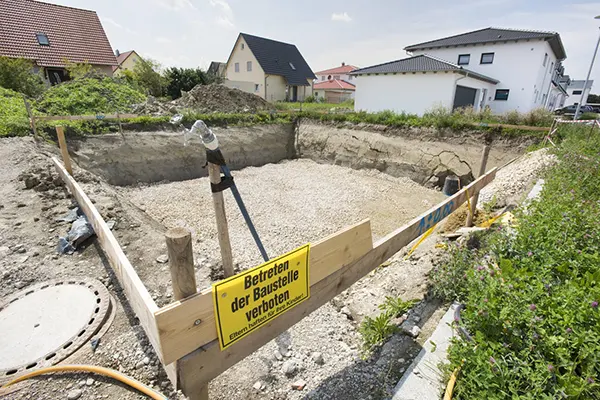You might not think about your home’s foundation until something goes wrong, but recognizing early signs can save you a lot of trouble. Look for cracks in the walls, uneven floors, or doors that stick—these could mean your foundation is shifting. Water pooling around your home or leaks in the basement are also red flags.
If you’re wondering what these signs mean and how serious they might be, it’s worth exploring the various types of foundation problems and their potential impacts on your home.
Common Signs of Foundation Issues
Many homeowners may not realize they’re living with foundation problems until significant damage occurs. You should be vigilant for several common signs indicating underlying issues.
Cracked walls often signify foundation settlement, where shifts in soil or moisture levels cause stress on the structure. Uneven floors can also point to this settlement, making it difficult to walk smoothly through your home.
Sticking doors might seem minor, but they often reveal deeper foundation complications. When a foundation shifts, door frames can warp, leading to operational difficulties.
Additionally, if you notice basement leaks, it can indicate moisture issues that compromise the foundation’s integrity. Such moisture can facilitate mold growth, creating health hazards and further damaging your property.
Moreover, foundation problems can attract pest infestations, as insects may exploit cracks and gaps in your home. This scenario can exacerbate existing moisture issues, creating a vicious cycle of deterioration.
Types of Foundation Problems
Understanding the various types of foundation problems is essential for maintaining the structural integrity of your home. Foundation issues can arise from several factors, including soil movement, moisture, and improper construction.
One common type is settling, where the foundation sinks unevenly, often leading to uneven floors. This can create significant challenges in your living space, as you may notice doors that stick or gaps between walls and ceilings.
Another prevalent issue is heaving, where the foundation lifts due to expanding soil. This can result in cracked walls, particularly around windows and doors, indicating that the foundation is under stress.
Additionally, you might encounter lateral movement, where soil pressure causes the foundation walls to bow inward, compromising stability.
You should also be aware of water-related problems, such as hydrostatic pressure, which can lead to cracks in the foundation itself.
If you observe any of these signs, it’s vital to address them promptly. Ignoring foundation problems can lead to extensive damage and costly repairs, so being vigilant about the types of foundation issues can help you protect your home effectively.
Impact of Weather on Foundations
Weather plays a significant role in the health of your foundation, influencing soil conditions and moisture levels that can exacerbate existing problems or create new ones. Seasonal changes can lead to soil expansion and contraction, affecting the stability of your foundation.
For instance, during wet seasons, increased moisture levels can cause the soil to swell, exerting pressure on your foundation. Conversely, dry conditions can lead to soil shrinkage, resulting in gaps and potential settling.
Temperature fluctuations also play a critical role. Cold winters can lead to frost heave, while hot summers may dry out the soil, both of which can create drainage issues. Poor drainage can further exacerbate erosion effects, washing away the soil that supports your foundation.
If you notice cracks or uneven floors, consider how weather patterns may have impacted your home. Keeping an eye on how moisture levels and temperature changes interact with your foundation’s soil can help you identify potential issues early.
Understanding these impacts allows you to take proactive steps in maintaining your foundation’s integrity and avoiding costly repairs down the line.
Importance of Regular Inspections
Regular inspections are essential for maintaining the integrity of your foundation and preventing minor issues from escalating into major problems. By conducting routine assessments, you can identify signs of distress early, such as cracks, settling, or moisture intrusion. This proactive approach serves as a form of preventive maintenance, allowing you to address concerns before they require costly repairs.
The recommended inspection frequency typically varies based on environmental conditions, the age of your home, and past foundation issues. Generally, it’s wise to perform a thorough inspection annually, but if you live in an area prone to extreme weather, consider increasing this frequency. Seasonal changes can greatly impact your foundation, so keeping a close eye during changing periods is vital.
During inspections, pay attention to changes in your home’s structure, including doors and windows that stick or gaps that develop between walls and ceilings. Documenting these observations can help you track patterns over time, making it easier to spot emerging issues.
Regular inspections not only safeguard your investment but also provide peace of mind, knowing that you’re actively protecting your home’s foundational integrity.
When to Call a Concrete Professional
Recognizing the right moment to call a professional can be essential in addressing foundation issues effectively. Ignoring early signs can lead to costly foundation repair and compromise your home’s structural integrity.
Here are four key indicators that signal it’s time to reach out to an expert:
Visible Cracks: If you notice significant cracks in your walls or foundation, especially those wider than a quarter of an inch, it’s a cause for concern.
Doors and Windows: When doors and windows stick or fail to open and close properly, it may indicate a shift in the foundation.
Uneven Floors: If your floors feel uneven or sloped, this could suggest underlying foundation issues that require professional assessment.
Water Intrusion: Persistent moisture or pooling water around your foundation can lead to further damage, indicating a need for immediate attention.
If you observe any of these signs, don’t hesitate to call a foundation repair specialist. They can accurately diagnose the problem and recommend the appropriate steps to restore your home’s structural integrity.
Early intervention can save you time and money in the long run.

